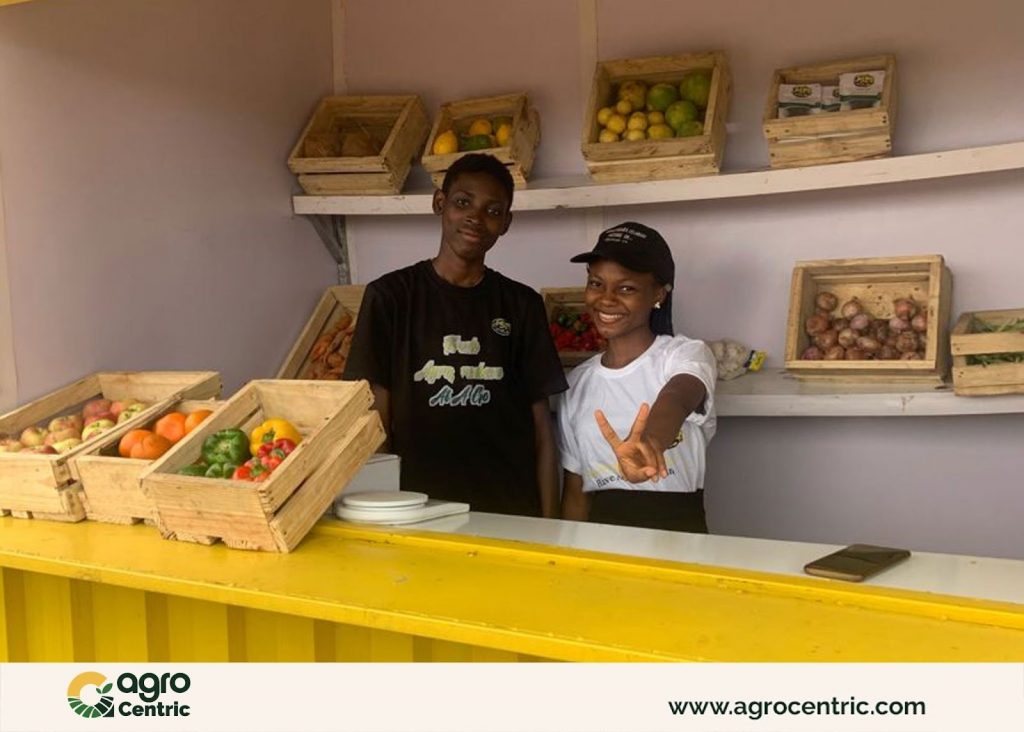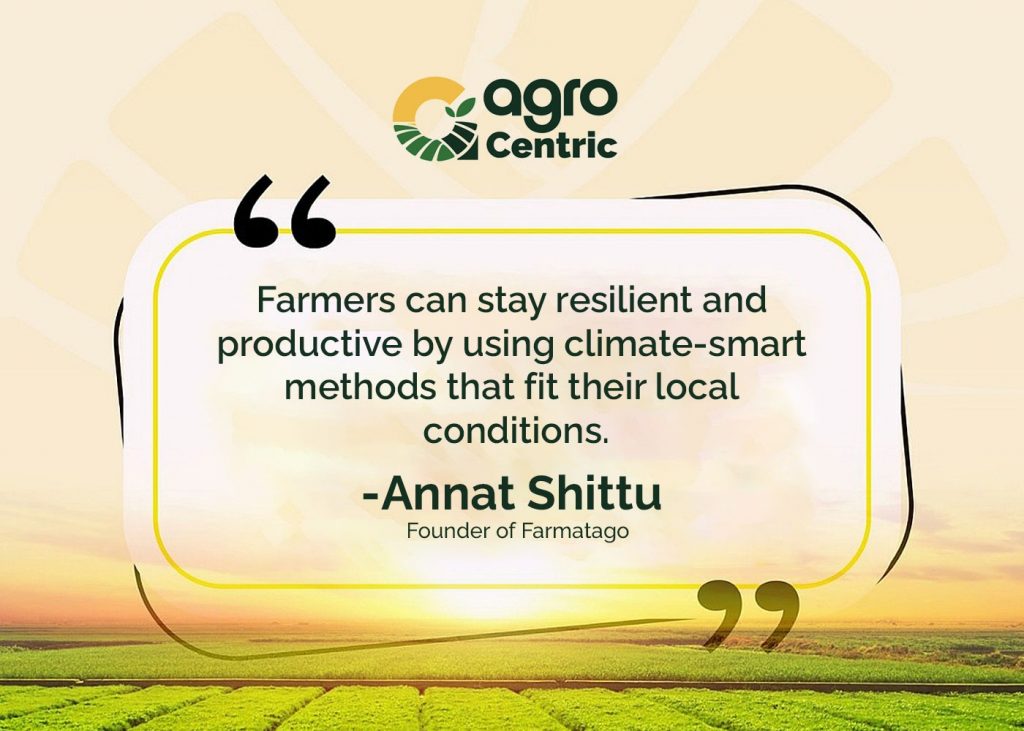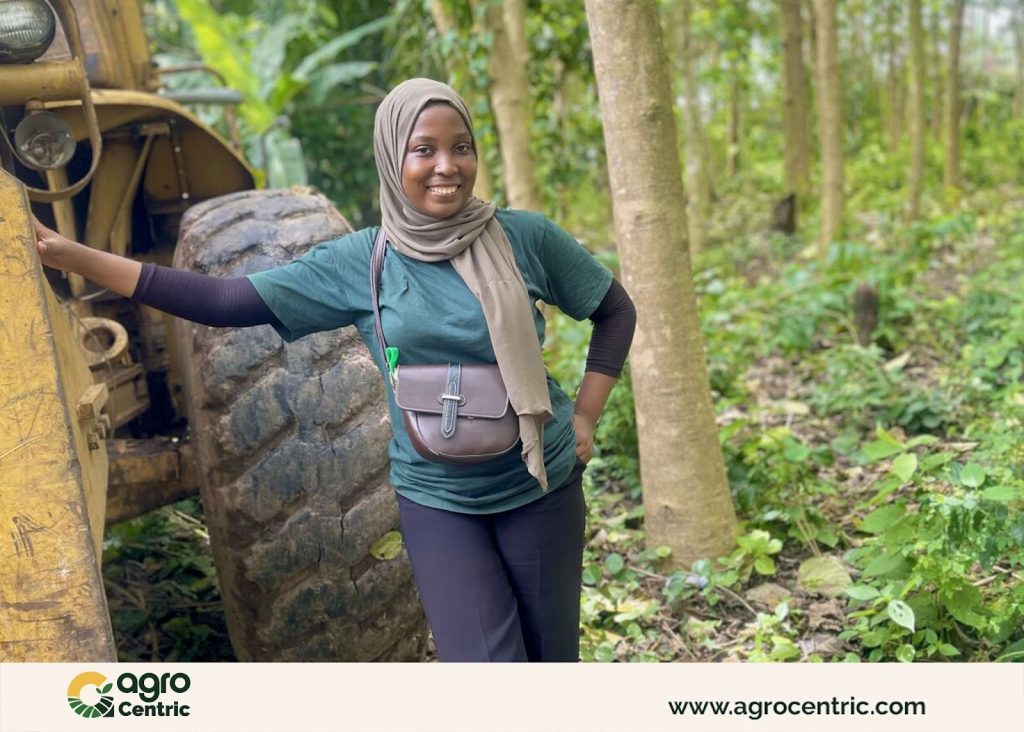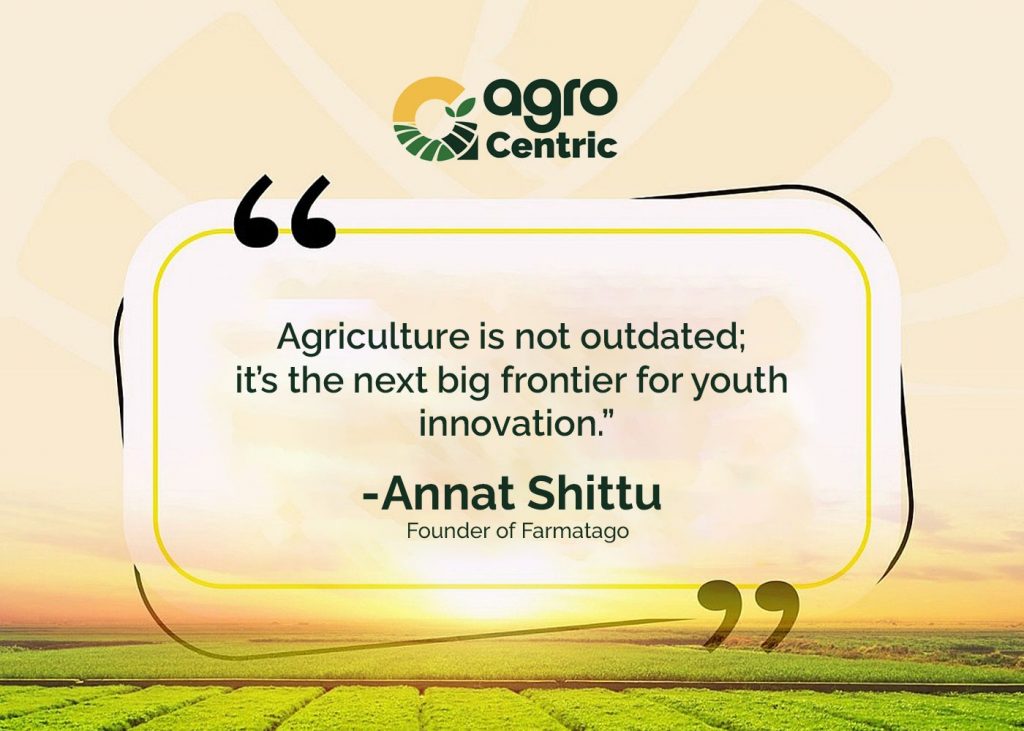
Nigeria’s agriculture sector faces a long-standing challenge: farmers produce, yet profits rarely reach them. Post-harvest losses and weak market access keep smallholders trapped in cycles of waste and uncertainty. Add poor logistics, inadequate storage, and unreliable buyers, which is heartbreaking. Every year, tons of food rot before being sold, costing farmers income and hope.
For Annat Shittu, founder of Farmatago, these losses were personal. As a farmer and agribusiness innovator, she’s building structured, transparent systems that help producers sell their goods faster, reduce waste, and earn sustainable incomes.
In her conversation with AgroCentric, Annat shares her journey from a campus vendor to a national advocate for market access, how Farmatago is reshaping Nigeria’s food economy, and why youth collaboration will drive Africa’s next wave of agricultural transformation.
Please tell us about yourself and how this journey into Agriculture began.
Thank you. My name is Annat Shittu, but most know me as Farmer Annat. I’m the founder of Farmatago, a company focused on tackling post-harvest losses, improving market access, and building sustainable food systems.
Interestingly, agriculture wasn’t my first choice. I wanted to study Pharmacy, but was offered Crop Production and Protection instead. Over time, I developed an interest because I grew up in a farm community, and whilst learning more, I was an intern and a volunteer. I then began to see opportunities to tap into and more challenges to tackle.
While in school, I noticed that many students struggled to buy fresh, well-packaged produce. Most vegetables sold around campus were poorly handled, so I started buying directly from local farmers and repackaging them neatly before reselling. That small idea became the foundation for Farmatago. It began as a personal initiative from my hostel room, but today it’s grown into a structured enterprise with systems that connect farmers and consumers efficiently.
You’ve mentioned before that growing up in a community shaped your outlook. In what ways did that experience influence what you’re building now?
Growing up in Ibadan had a big influence on me. It’s a city surrounded by farmlands, and I grew up seeing farmers produce more than they could sell. Watching heaps of tomatoes, peppers, and vegetables go to waste was heartbreaking because there was no structured way to get them to the market. Those images stuck with me.I realised that most farmers don’t lose money because they farm badly; they lose because they can’t sell what they produce at the right time or at a fair price.
After all, there’s no proper system to move food from the farm to the people who need it. That’s the real challenge. Many farmers sell their produce at a low price just to avoid waste, and this cycle keeps them poor. Farmatago was my response to that. I wanted to build a bridge to connect farmers directly to consumers and businesses in a way that benefits everyone. The idea is simple: structure the system, and the farmers will thrive.

Let’s talk about those early days. What challenges did you face when you started Farmatago, and how did you push through them?
The early days were really tough. My biggest challenge was fear, fear that people wouldn’t take me seriously, fear of rejection, and fear of failure. I was a student with no business experience trying to run something that seemed much bigger than I was. But I’ve learned that fear can either paralyse you or push you. For me, it became fuel.
When I started, gaining access to packaging materials was a huge problem. I wanted my products to look clean and appealing, but I couldn’t find proper packaging suppliers in Ile-Ife. I had to improvise, cutting, wrapping, and labelling things by hand. I also didn’t have much capital, so I reinvested every kobo I made.
Funding wasn’t my biggest issue; access to resources was. Finding good-quality packaging, stickers, and cold storage was more difficult than finding money at the time. Even when we grew, logistics became another hurdle. Nigeria’s transportation system is unpredictable, and getting fresh produce from farmers to markets without spoilage requires serious planning. But I didn’t stop. I used those limitations as opportunities to innovate. For example, we began developing our Salocool Climatic Chiller, a natural cooling system that helps preserve fresh produce without the need for electricity. That innovation came directly from the struggles we faced in storage and logistics.
You were still a student at the time. How did you manage to balance schoolwork with running a growing business?
It wasn’t easy at all. There were times I’d finish lectures and head straight to the farm to buy produce, then spend the evening packaging and preparing deliveries. It was a lot, but I learned early that structure is everything. I treated Farmatago like a real company even when it was just me. I created processes, delegated tasks, and hired one or two people to help with customer service and deliveries. That made a big difference. I would say structure and priority helped me survive that phase.
There were days when my hostel room doubled as an office and warehouse. I remember arranging vegetables in crates under my bunk so they’d stay cool. Looking back, it was funny and stressful, but it taught me discipline. At some point, I realised I had to build systems that could run without my physical presence all the time. That shift in mindset was a turning point. It allowed me to focus on strategy while my small team handled daily operations.
What was the turning point when you realised Farmatago could become something bigger than a campus business?
The turning point came when we started attracting customers outside the university. Restaurants and hotels began placing orders, and some even requested that we handle bulk supplies. That was when I realised this wasn’t just a student hustle, but a solution that people genuinely needed.
Another significant moment was when we started working directly with farmers. Seeing the excitement on their faces when we off-took their produce at fair prices made me realise the scale of what we were building. We weren’t just selling vegetables anymore; we were building a bridge that impacted lives. That’s when I became intentional about branding, partnerships, and documentation. I wanted Farmatago to be known not just as a business, but as a system that solves real problems in the food supply chain.
Farmatago is known for combining innovation with impact. Could you describe some of the systems and initiatives you’ve developed?
Yes, Farmatago is developing systems that address real-world problems in agriculture. Our approach is centred around systems, innovations, and initiatives. Under our innovation focus is Makét, a digital marketplace connecting farmers directly with customers. Through Makét, farmers can list their produce, and customers can place orders directly. The platform will also provide farmers with pricing trends and demand data, enabling them to make informed business decisions.
Then we have EasyChop, a ready-to-cook meal kit that makes healthy eating more convenient. It’s perfect for busy people who want nutritious food without the stress of prepping ingredients. The kits are made from fresh produce sourced directly from farmers, creating another reliable market for them.
But innovation alone isn’t enough. That’s why we run the Food Safety and Post-Harvest Sustainability (FSPS) initiative. FSPS focuses on training and sensitisation; we enter communities to educate farmers, processors, and traders about food safety, waste reduction, and post-harvest handling. So far, we’ve reached several farming clusters, helping people improve food quality and income. We also created the Supply Access Network, which enables young people between 18 and 35 to serve as farm-to-market agents. They earn income by linking farmers to buyers and facilitating distribution while learning about agricultural supply models and related knowledge. This not only provides youth employment but also strengthens local supply chains. Our goal is to make agriculture profitable, inclusive, and sustainable for everyone involved.

Collaboration plays a huge role in your work. How important are partnerships to Farmatago’s growth?
Partnerships are everything. From the beginning, I knew we couldn’t do this alone. Through our FSPS initiative, we’ve partnered with organisations like the Global Alliance for Improved Nutrition (GAIN), which supported some of our early innovations and training efforts, and HortiNigeria, which has been instrumental in strengthening our value-chain development and farmer support programmes. We also collaborate with local government bodies, universities, and private sector players to extend our reach. Each partnership brings something valuable; sometimes it’s technical knowledge and access to farmers or new markets. But beyond resources, partnerships give us credibility. When people see others working alongside you, they are more likely to believe in your mission.
One of my favourite parts of collaboration is co-creation, sitting with other innovators, farmer groups, or NGOs to brainstorm solutions that work for real people. That’s what keeps Farmatago evolving. We’re not building in isolation but together with the ecosystem.
Do you have any success stories from farmers you’ve worked with, showing how your solutions have reduced post-harvest losses?
Yes, there have been many, and sometimes I’m even surprised by how far the impact has spread. I was recently a speaker at an EDC program in Lagos, and during the session, a farmer stood up and said, “Farmatago once off-took from me. I’m planting again and hope they’ll buy this time.” I smiled and told him, “Of course, we’re available.” Moments like that remind me why we do what we do. It’s fulfilling to see farmers smiling because they’re making more money without losing their produce. At our FSPS trainings, too, we also meet farmers we’ve previously worked with who come back just to maintain that relationship. Some of them even bring new farmers along with them.
We’ve also seen situations where farmers, on the verge of losing their produce, reach out to us for offtake support and that simple intervention saves their farms. For me, the biggest success is the sustainability we’ve helped them achieve. When farmers produce but have no reliable offtaker or market, they run at a loss and risk losing their investment. Our greatest achievement is helping farmers grow sustainably through continuous offtake support, improved income, and reduced waste. That’s what makes the entire journey worthwhile.

Running an agribusiness in Nigeria isn’t easy. What keeps you motivated despite the challenges?
What keeps me going is the impact I make. Knowing that my work helps farmers, youth, and women motivates me. Agriculture has been my sole source of income since I began, providing me with stability and purpose. Yes, the challenges are many: access to resources, logistics, and sometimes even people not understanding your vision, but I keep going because I can see the difference. When a farmer tells me they didn’t lose their produce or a young person tells me they now earn from agriculture, it makes all the stress worth it.
For me, agriculture is both impact and profit. It’s a sector where you can earn money while still improving people’s lives, and that’s what motivates me to do what I do every day.
What is your long-term vision for Farmatago and African agriculture?
The vision is to make Farmatago Africa’s leading agri-supply chain company, reducing post-harvest losses and providing farmers with better access to markets. We want to replicate our model across states and campuses, and expand our Supply Access Network across the continent. Our goal is to create a strong structure that connects every stage of the value chain, from the farm to the final consumer.
We also plan to license our agritech solution, Makét, to other African countries. Our bigger dream is to make African food systems more organised, sustainable, and accessible.

As a young person succeeding in your field, what encouragement would you give others? How can we inspire more youth to enter agriculture, especially with its advancements in innovation and technology?
I’d tell young people to have a growth mindset and see beyond the present. Vision begins when you can see further than your current situation. A growth mindset helps you find direction and stay focused. Start small, but don’t stay small. Once you have that mindset, growth will come naturally.
And most importantly, learn to collaborate. No one can do it alone. Collaboration shouldn’t just be with big organisations, but with farmers and grassroots players. Farmers aren’t to be looked down on; if you’ve ever farmed yourself, you know how much farmers support one another. Even among ourselves, collaboration is key.
Many youths still think agriculture is hard or unstable. However, what matters most is understanding your sector and recognising your strengths. Don’t jump in blindly. For example, don’t invest in cashew when you know nothing about that market or community. Find what drives you. For me, it’s market access and post-harvest solutions. Working with farmers has always motivated me because it aligns with my strengths.
To any youth, I’d say: explore and learn early. That’s how you discover where you belong. I’ve worked in greenhouse farming, palm oil, bell pepper, and seed breeding. I completed internships, worked with biologists and nematologists, and gained experience across various sectors. All that helped me realise my strength lies in agribusiness. Some of my colleagues are in agricultural science, breeding better varieties of peppers and tomatoes. That’s their path. Mine is building systems that connect farms to markets. So, learn widely, find your passion, and focus on where your strengths lie. Once you do, the agricultural space becomes a place where you can thrive.
Thank you, Annat. From her campus beginnings to national recognition, Annat Shittu continues to build a future where farmers thrive and food systems flourish. Follow Annat Shittu and Farmatago on LinkedIn to learn more about their journey and the partnerships driving Africa’s agricultural transformation.